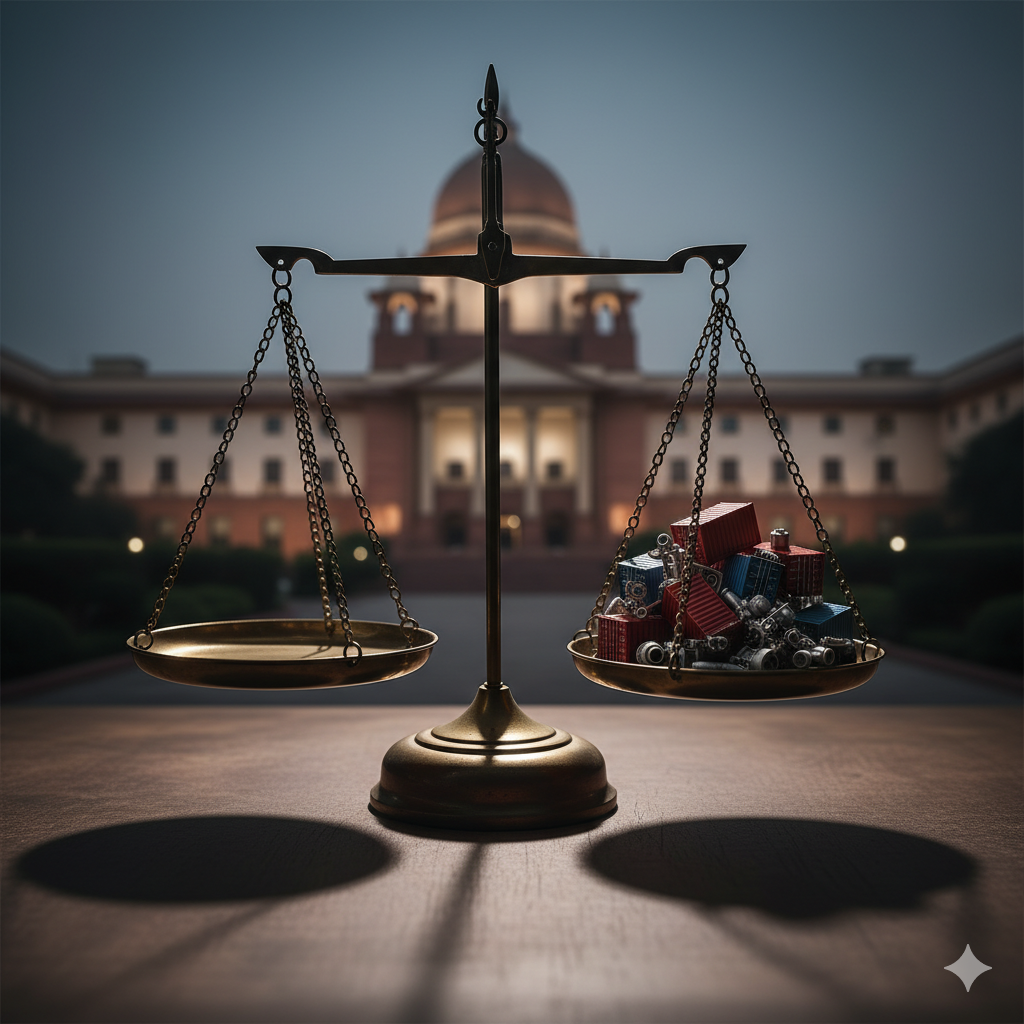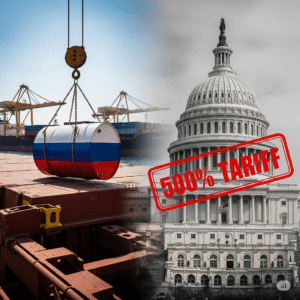Akash Gupta | AI Generalist & Content Specialist, Sunshine Cargo Services, Kolkata, India — September 25, 2025
The Delhi High Court Case That Could Reshape India’s Anti-Dumping Rules
A legal battle is underway that could change trade disputes in India. The Delhi High Court is reviewing the powers of the Customs, Excise and Service Tax Appellate Tribunal (CESTAT). This case could decide where companies can challenge anti-dumping duties. It’s a complex issue affecting everyone from small importers to global corporations like EssilorLuxottica Asia Pacific. We’ll break down the key issues and what this means for Indian trade.
Looking for a reliable customs clearing & forwarding agent to handle your import shipments? Let’s Talk!
Key Takeaways
-
The Core Issue: A 2023 law limited CESTAT’s power to hear appeals against anti-dumping duties imposed by the government, sparking a legal challenge.
-
Before the Amendment: Companies could challenge both the Designated Authority’s (DA) technical findings and the government’s final duty order at CESTAT.
-
The Legal Challenge: CESTAT ruled the 2023 amendment was not yet in effect, but the Union government successfully got a stay from the Delhi High Court.
Table of Contents
-
Understanding Anti-Dumping and Its Legal Framework
-
The Impact of the Finance Act, 2023
-
Why the Delhi High Court Case Matters
-
How India’s Framework Compares Globally
-
A Deep Dive into the EssilorLuxottica Case
-
Common Mistakes Companies Make When Challenging Duties
-
FAQs about Anti-Dumping Duties and Appeals
-
Conclusion
Understanding Anti-Dumping and Its Legal Framework
Anti-dumping duties are trade protection measures. They are designed to prevent foreign companies from flooding a country with goods at unfairly low prices. This practice, known as “dumping,” can harm domestic industries.
Summary: Anti-dumping duties are taxes on imported goods to protect local businesses from foreign competitors selling products at very low prices.
In India, this framework has two main players. First, the Directorate General of Trade Remedies (DGTR), formerly the Designated Authority (DA). The DGTR is a government body that investigates claims of dumping. It collects data and determines if dumping has occurred. It also assesses if the domestic industry is suffering “material injury.” After its investigation, the DGTR recommends a duty. Second, the Union government has the final say. It can choose to impose, modify, or reject the DGTR’s recommendation. If you want to understand more about customs duties in general, check out our customs duty FAQs.
Before the 2023 law, companies had a clear path to appeal. They could challenge both the DGTR’s technical findings and the government’s final decision. These appeals were heard by CESTAT. This gave companies two different ways to fight the duties.
The Impact of the Finance Act, 2023
The Finance Act, 2023 changed the rules. This law limited CESTAT’s jurisdiction. It states that CESTAT can now only hear appeals against the DGTR’s findings. It can no longer review the government’s final notification. This change was also applied retrospectively, starting from 1995.
Summary: The 2023 law, with retrospective effect, took away CESTAT’s power to hear appeals directly against the government’s final anti-dumping orders.
This created immediate confusion. Companies could no longer directly challenge a government decision. For instance, if the DGTR recommended a low duty but the government imposed a much higher one, the company’s only recourse at CESTAT was to challenge the DGTR’s recommendation, not the government’s action. This shift has forced companies to consider approaching the High Court for relief. This is a much longer and more expensive process.
Why the Delhi High Court Case Matters
This case is a landmark moment. It will provide crucial clarity on the law. The Delhi High Court will decide if the 2023 amendment is legally sound and if it has indeed stripped CESTAT of its power. This decision will define the future of anti-dumping appeals in India.
Summary: The court’s decision will determine if companies have a streamlined appeal process through CESTAT or a more complex one through the High Court.
According to Devinder Bagia, an executive partner at the law firm Akshmikumaran & Sridharan, this legal confusion has already caused problems. Bagia stated,
“For more than two years, the CESTAT’s Anti-Dumping Bench has not heard any appeals, a void deeply felt across the industry.”
He added that the retrospective amendment “created confusion over the tribunal’s jurisdiction.” This case will hopefully end that confusion. A clear legal path is vital for trade and business certainty. For more on the customs clearance process in India, read our guide on the complete import, export, and customs clearance process in India.
How India’s Framework Compares Globally
India’s anti-dumping framework is at a turning point. Its current system is different from other major economies. In the US, companies can appeal to the Court of International Trade. This court reviews both the technical findings and the government’s imposed duties. The European Union has a similar comprehensive review process. Challenges go through the General Court and can even reach the Court of Justice of the EU.
Summary: Unlike the US and EU, India’s system now lacks a clear judicial review for the government’s final anti-dumping duty decisions.
The 2023 amendment aligns India with the goal of “minimum government.” However, it could also reduce judicial oversight. This may make it harder for companies to challenge what they see as unfair duties. It also increases the risk of higher litigation costs.
A Deep Dive into the EssilorLuxottica Case
The legal dispute was sparked by a specific case. Global lens manufacturer EssilorLuxottica Asia Pacific challenged an anti-dumping duty. The duty was on semi-finished ophthalmic lenses from China. When the case came before it, CESTAT ruled that the 2023 amendment was not yet in effect. It held that the government needed a separate notification to implement the law. Based on this, CESTAT said it still had the power to hear the appeal.
The Union government disagreed strongly. It appealed CESTAT’s ruling to the Delhi High Court. The government argued that the amendment was in force and that CESTAT was wrong. On September 22, 2025, a division bench led by Justice Pratibha Singh stayed CESTAT’s ruling. This pause puts the entire matter under the High Court’s review. The case highlights the core issue of a lack of clarity in legal procedures.
Common Mistakes Companies Make When Challenging Duties
-
Failing to Participate Early: Companies often wait until the duty is imposed. The best time to act is during the DGTR investigation itself.
-
Focusing on the Wrong Issues: Following the 2023 law, it’s a mistake to focus solely on the government’s final order. The focus must be on the DGTR’s technical findings.
-
Lack of Proper Documentation: Anti-dumping cases are highly technical. Incomplete or incorrect data can weaken a company’s case, making it easy for the authorities to dismiss the appeal. To avoid this, consider working with a customs clearing and forwarding agent. For more information, read about the importance of customs clearing and forwarding agents in imports and exports.
-
Not Seeking Legal Advice: The legal landscape is complex and rapidly changing. Experts in trade law are crucial for navigating the process effectively.
FAQs about Anti-Dumping Duties and Appeals
Q1. What is an anti-dumping duty?
An anti-dumping duty is a tariff imposed by a government on imported goods that it believes are priced below their fair market value, protecting domestic industries from unfair competition.
Anti-dumping duties are a form of trade protection. They are used when a foreign company sells a product in another country at a price lower than its normal value. This normal value can be the price in its home market or a calculated cost. The goal is to prevent the foreign product from causing “material injury” to the domestic industry. These duties are regulated by the World Trade Organization (WTO) and implemented by national governments, like India’s Directorate General of Trade Remedies (DGTR) and the Union government.
Q2. Who decides on anti-dumping duties in India?
The Directorate General of Trade Remedies (DGTR) investigates dumping and recommends a duty, but the final decision to impose the duty rests with the Union government.
The process is a two-step one. The DGTR, an office under the Ministry of Commerce and Industry, initiates and conducts the investigation. It examines data on pricing, market share, and injury to domestic firms. Its findings are a recommendation. The Union government, specifically the Ministry of Finance, then reviews this recommendation. It issues a customs notification to officially impose the duty. For more details on recent changes to customs duties, see our analysis of the India Union Budget 2025 customs duty changes.
Q3. What is CESTAT’s role in anti-dumping cases?
Before 2023, CESTAT had broad power to hear appeals against both the DGTR’s findings and the final duty orders, but a new law has limited its jurisdiction.
The Customs, Excise and Service Tax Appellate Tribunal (CESTAT) is a quasi-judicial body. Its purpose is to hear appeals on matters of customs, central excise, and service tax. It has a special bench for anti-dumping issues. Following the Finance Act, 2023, the government’s position is that CESTAT’s power is now limited. It can only review the DGTR’s technical determinations, not the final government notifications. The Delhi High Court is currently reviewing this matter.
Q4. How does the 2023 Finance Act change the process?
The Finance Act, 2023, a retrospective law, prevents companies from directly appealing the final government notification imposing an anti-dumping duty at CESTAT.
The key change is the scope of appeals. Previously, a company could challenge both the investigative findings and the final order. The new law limits appeals to only the investigation findings. This means if the government’s final duty order deviates from the DGTR’s recommendation, a company cannot challenge that deviation directly at the tribunal.
Q5. What is the status of the legal case at the Delhi High Court?
The Delhi High Court has stayed a CESTAT ruling that the 2023 amendment was not yet in effect, and it will now decide if CESTAT has the power to hear appeals against government anti-dumping notifications.
The case was brought by the Union government. It challenged CESTAT’s decision in the EssilorLuxottica case. CESTAT had ruled that it retained its full jurisdiction. The High Court’s stay on this ruling means the matter is now in its hands. The court’s final verdict will be a major legal precedent. It will clarify the rights of importers and the scope of judicial review in India’s anti-dumping regime.
Conclusion
The Delhi High Court’s review of CESTAT’s jurisdiction is a critical development. It has the potential to reshape India’s legal landscape for anti-dumping disputes. This decision will offer much-needed clarity. It will determine whether companies must navigate a more complex legal path or can continue to rely on the tribunal for appeals. For businesses, the outcome will define the cost and complexity of fighting trade disputes in the coming years.
Want to import a shipment hassle free? We are doing this from the last 40 years! Let’s talk!
sunshine cargo services
private limited
Head Office Address:
Marshall House, Room 574, 33/1, N.S. Road/25, Strand Road, Kolkata West Bengal 700001
Contact:
Deepak Kumar: +91-98300-66760
Manish Kumar: +91-98363-29801
Email:
su************@***oo.com
Working Hours:
Monday-Friday: 10:00 AM to 18:00 PM
Saturday: 10:00 AM to 14:00 PM
Closed on Sundays and Indian Government Holidays.
Service Offices:
Raxaul, Bihar, India
Jogbani, Bihar, India
All Rights Reserved by Sunshine Cargo Services Private Limited.
Developed by FresioMedia.




